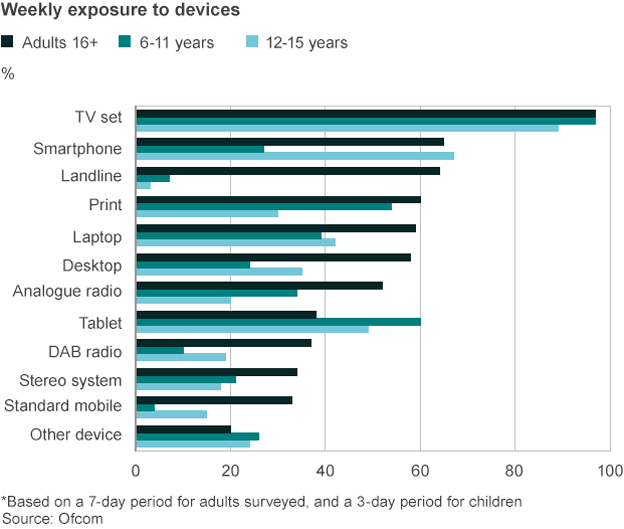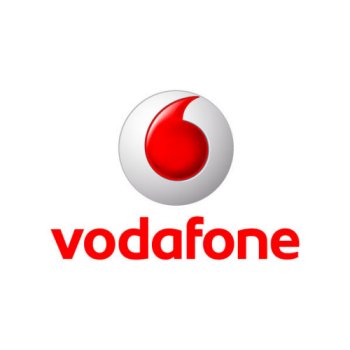|
Is it the end of the road for the telephone landline? |
||||||||
OFCOM recently published this year's communications market report detailing digital trends and usage amongst different age groups. [Link]
There report starts off with a particularly punch quote:
"As a result of growing up in the digital age, 12-15 year olds are developing fundamentally different communication habits than older generations, even compared to the advanced 16-24 age group."
It goes on to explain how its children leading the digital revolution with mass adoption of online applications and channels.
The following graph shows the 'weekly exposure to devices':

One thing that this report does highlight is that over the generations surveyed landline telephone usage is on the decline. This raises some interesting questions, and a few intriguing possibilities.
I put a an example case to you:
When I was a child the Landline was the ONLY telephone in the house. Now it's pretty much an ornament as modern mobile contracts tend to come with so many inclusive minutes that I only ever use the landline for premium numbers that are free on that over the mobile. All of the adults in the house have thousands of inclusive minutes. Why would they ever use the landline? Despite that I still pay a month fixed line fee though, but the actual usage bill is regularly in the pence cost bracket.
The OFCOM report is showing exactly this behaviour in children. Mobile usage is massively up, for a number of reasons, such as barriers to entry lowering, i.e. handset costs and contract allowances, and increased stability and speed in mobile networks means that the quality of service is always improving. Just search for 4G coverage in the UK.
What are the reasons for having a landline?
So why do people still have landlines?
- 1. The first reason is to make calls.
- 2. The second reason is because of other over-the-top services such as broadband and TV services
- 3. The third is as a bundled product. Often service providers will cut you a discount for taking many products instead of just one. For example if I remove my landline from my Virgin Media bundle I'll actually pay MORE for not having it.
So what is the Landline used for now?
So realistically that leaves the second reason as the most valid. Some providers are still using the landline for TV broadcasting or device communications rather than their satellite network (I'm looking at you Sky). But doesn't that seem counter intuitive? Having to have a landline to support increasingly bandwidth hungry Hi-definition TV channels? What the OFCOM report shows is that the newest generations of our society don't use a landline at all. When they come of age as to be moving into their own homes and having the conversations with service providers about 'requiring a landline because you have TV' there is going to be a serious customer backlash.
Death of the landline
So I'm predicting that he landline has to find another purpose. Or its Dead. It's not good enough to be in a bundle of service, or to merely be a cost differentiator. It has to do something. Otherwise 'digital natural selection' will occur and Broadband and satellite comms will consume it.
It will follow the usual pattern of decline in as much as customer uptake will drop, meaning that the cost will rise. Suddenly all the cost and effort in dropping new lines into new housing estates and renewing old lines will start to look like a bad expenditure to the big telecoms companies. The landline will price itself out of the market, and investment in it will shrink.
You just watch. Next years annual OFCOM report will show even less landline usage in the youth generation.
|
Sony confuses its customers with product fragmentation |
||||||||
So E3 is here again, along with a flurry of consumer news, games and future predictions on the trends of technology, or at least where the big entertainment companies would like us to think it's going anyway. This is our (the consumers) big window into their (the mega corp entertainment company) plans and products that we are all too excited about buying up for the next year.
Sony released big news about new games, old games being redone in HD, new devices and new online services. The key take home message for me was all about Sony Saturation. I can't quite decide if their Vision is saturate the market in devices that all do the same thing, or whether they just don't have a Vision at all, which has led to product development, where all their devices can do the same thing. Either way what we consumers are looking at is a dizzying array of Sony hardware and software services, much of which does exactly the same as its counterparts.
Sony already have Smart TVs, many of which are getting the ability to play older PlayStation titles. Now we are also hearing about the PlayStation TV, a set top box ($99,USA only at the moment) Which seems to be able to stream PS4 content to another TV (Sony MagicEye anyone?) Then of course you've got the PS4, which cannot play older titles, only high end new ones. On top of that there are numerous rollouts of PS Now and Sony store implementations across PS VITA and Smart TVs. What's PS Now? Well it looks like a cloud based service you access through your TV allowing you access to older games and movies, oh, and you don't need a console, all the grunt work is done at a Sony server somewhere in a datacentre.
So what's the problem with having several different types of device doing the same thing? Well for both Sony and its consumers it brings a couple of interesting pitfalls, both of a technical nature and of a customer nature.
- 1. The product offering is confusing. As a consumer how do I select products with overlapping capabilities? Do I want a console, or a TV I can use to play similar games?
- 2. How do I manage my games collection? Are there custom versions of the Sony store per device to stop my buying the wrong product on the wrong device? Account management will become a much more intelligent process.
- 3. What impact does all this have on existing devices? How difficult are these things becoming to use? All these additional layers of software can't impede the customers too much, otherwise no-one will participate.
- 4. How does Sony keep them all up-to-date? TVs are notoriously bad at being updated, the big TV manufacturers would rather you buy a new TV every year than produce an upgrade roadmap for you. With more devices come more development, more testing and more releases. None of this comes cheap.
So for now, I'll wait and see how each of these pans out, but it does feel a little like Sony are rather randomly shooting at fish in a lake and seeing which one they hit first.
For further reading you can check out the BBCs article on E3 opening presentations here: http://www.bbc.co.uk/news/technology-27774813
|
SMS turns 20 years old today |
||||||||
"On December 3 1992, engineer Neil Papworth sent the first SMS message to Richard Jarvis of Vodafone. It simply read "Merry Christmas", and Jarvis had no way of replying."
The Short Message Service turns twenty years old today. It's hard for us to consider a world without such common technologies as the SMS and easily accessible mobile communications but think about that statement for a second.
SMS is only twenty years old.
Only twenty years ago a technology came along that has radically changed the way people communicate, in both business and social environments. Think how much harder things would be now if SMS wasn't easily available? The most amazing thing about SMS is that is isn't all that complicated in comparison to most smartphone functionality. SMS is accessible to everyone with a mobile, through a common interface. It doesn't require a special network protocol or data system, it is truly available to everyone, all around the world.
Think about the impact that SMS has had on changing the English language, think of how much English has changed due to the short nature of messaging, look at terms we are all familiar with now (Lol, BRB) that have come around specifically due to human interaction with the SMS technology.
From its humble beginnings things have changed. People are innovators, and they have driven the SMS message on to greater and greater things, like MMS and now modern messaging services like WhatsApp and Skype. These are all essentially driven from the SMS concept.
You can read a lot more information about the background of the SMS here, from the Telegraph:
Or the Guardian:
http://www.guardian.co.uk/technology/2012/may/06/sms-text-messages-20th-birthday
My thinking is that the mobile landscape is still a very new and exciting environment. The technology landscape is still forming and innovations like SMS are frequent and game changing.
The coolest thing about SMS technology for me? Working for the company that made SMS a reality, and that 4 billion people use every day.

|
NHS Launches Blood donor mobile app |
||||||||
I've donate blood for a few years now. I view it as a relatively easy thing to do, that causes no harm to me, and can help save someone life. I won't miss the blood they take, my body will just create more of it naturally, and there is a reward card system where they change the color of your card based on the number of donations (I'm a sucker for any kind of reward based system).
What's the biggest problem with donating blood? Finding and booking a session.








